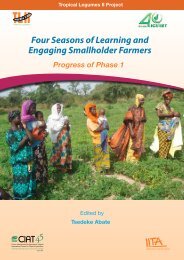Four Seasons of Learning and Engaging Smallholder Farmers - icrisat
Four Seasons of Learning and Engaging Smallholder Farmers - icrisat
Four Seasons of Learning and Engaging Smallholder Farmers - icrisat
You also want an ePaper? Increase the reach of your titles
YUMPU automatically turns print PDFs into web optimized ePapers that Google loves.
A 10-day intensive training workshop on groundnut breeding methods <strong>and</strong> techniques was held at<br />
ICRISAT-Mali from 26 January to 6 February 2009 for research assistants <strong>and</strong> scientists. A total <strong>of</strong> eight<br />
participants (two from IER, Mali, two from INRAN, Niger, three from IAR, Nigeria <strong>and</strong> one from ICRISAT)<br />
attended the workshop. The course covered a range <strong>of</strong> topics organized in 10 modules. Two technical<br />
guides in groundnut breeding <strong>and</strong> PVS were prepared <strong>and</strong> their s<strong>of</strong>t copies were made available to the<br />
participants. The project also contributed to the training <strong>of</strong> research technicians from IER, Mali, INRAN,<br />
Niger <strong>and</strong> ICRISAT-Mali in data capture <strong>and</strong> analysis using the GENSTAT statistical program from 9-20<br />
February 2009. A total <strong>of</strong> 33 participants attended the training.<br />
Degree training<br />
Two PhD students (from Niger <strong>and</strong> Nigeria) at the West Africa Center for Crop Improvement (WACCI),<br />
University <strong>of</strong> Ghana, were mentored to formulate <strong>and</strong> present their thesis research project proposals in<br />
groundnut breeding.<br />
Training farmers<br />
Before the implementation <strong>of</strong> the PVS trials, a 1- to 2-day training session was conducted for the<br />
participating farmers in the respective locations. Group meetings were also held during field monitoring<br />
by the project staff. More than 2,000 persons including farmers <strong>and</strong> extension agents have benefitted<br />
from the training by the end <strong>of</strong> 2009. In 2010, a total <strong>of</strong> 150 women from the farmer groups in five<br />
villages in Sanakoroba district <strong>of</strong> Mali participated in a pre-sowing 2-day training program in good<br />
practices <strong>of</strong> producing groundnut. In addition, 10 village (all men) agents <strong>and</strong> 2 staff (1woman <strong>and</strong><br />
one man) <strong>of</strong> PLAN-Mali also benefited from the training. ICRISAT-Mali provided the facility. IER-Mali<br />
facilitated training <strong>of</strong> 75 farmers in integrated crop management at the sites in the Kayes region where<br />
demonstration plots were established.<br />
Establishing an efficient improvement program for NARS<br />
At the beginning <strong>of</strong> the project no hybridization activity was conducted at any <strong>of</strong> the participating<br />
NARS. After the training <strong>of</strong> technicians in managing crossing blocks, <strong>and</strong> the rehabilitated facilities,<br />
hybridization has been initiated at INRAN <strong>and</strong> IAR<br />
Farmer-friendly literature<br />
ICRISAT prepared simplified brochures on varieties grown in Mali <strong>and</strong> crop management in French for<br />
eventual translation into Bambara.<br />
Lessons learned/concerns<br />
• The release <strong>of</strong> new breeding lines remains a very slow process. This is largely due to variety release<br />
committees not meeting or the NARS partners not being aggressive enough to promote new<br />
varieties through nationally coordinated trials <strong>and</strong> on-farm validation tests. However, through PVS<br />
the variety release process can be fast-tracked;<br />
• The major challenge facing women groundnut farmers is the limited access to good l<strong>and</strong> <strong>and</strong> farm<br />
equipment to reduce drudgery in the production <strong>and</strong> processing <strong>of</strong> groundnut;<br />
• The project involves many sites - some in isolated locations - making coordination <strong>and</strong> monitoring<br />
a challenge. Focusing on one key region per county will be the most effective in terms <strong>of</strong> resource<br />
use <strong>and</strong> sustainability. Successful interventions can be replicated in other regions.<br />
76<br />
<strong>Engaging</strong> <strong>Smallholder</strong> <strong>Farmers</strong> | Tropical Legumes II Project

















